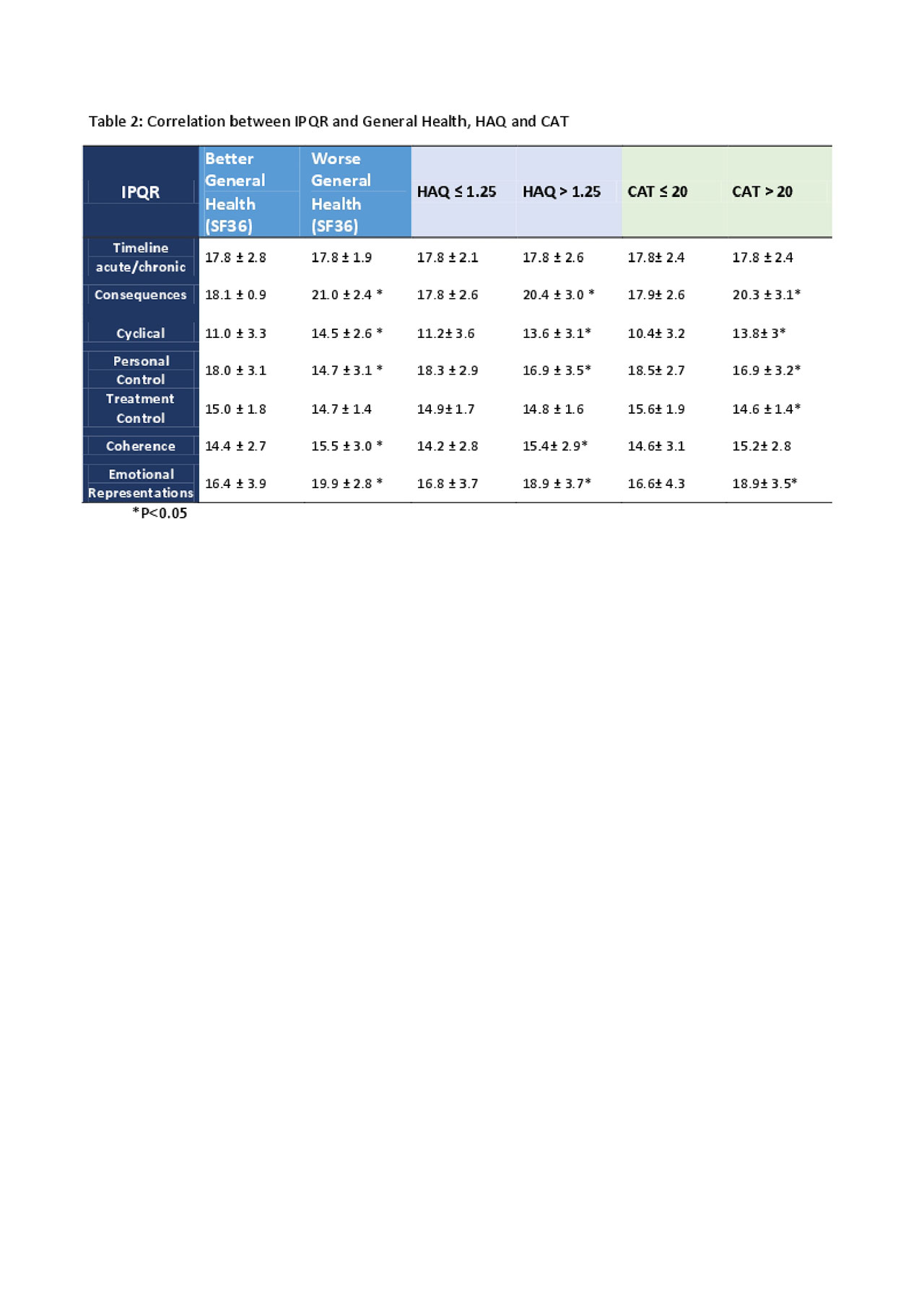Session Information
Date: Tuesday, November 12, 2019
Title: Patient Outcomes, Preferences, & Attitudes Poster II: Patient Preferences, Beliefs, & Experiences
Session Type: Poster Session (Tuesday)
Session Time: 9:00AM-11:00AM
Background/Purpose: Lung disease is the current leading cause of death and the most common severe complication of systemic sclerosis (SSc), causing a significant adverse impact in quality of life. Due to its severity in the context of SSc, we decided to focus on SSc patients with pulmonary involvement to determine their perception about the disease and correlate with quality of life, degree of disability and symptoms, as well as expectations.
Methods: This cross-sectional study included SSc patients with symptomatic lung involvement who signed an informed consent. Demographic, clinical and laboratory information were collected from an electronic register database. Revised Illness Perception Questionnaire (IPQR), 36-Item Short Form Health Survey (SF-36), Health Assessment Questionnaire Disability index (HAQDI), COPD Assessment Test (CAT) and three direct questions regarding quality of life, expectations about treatment and survival were applied to patients. IPQR score have negative domains (higher score means negative perception) and positive domains (higher score means positive perception). Correlations between questionnaires were made to evaluate patient perception measured by IPQR and if those perceptions would affect their opinion.
Results: 130 consecutive SSc patients were included, 55 (42%) with limited SSc, 64 (49%) diffuse and 11 (8%) sine scleroderma. Mean age was 54±12.5 years and mean disease duration 12±9 years. All domains of IPQR statistically correlated with SF36, HAQ and CAT, except the perception of chronicity. The Pearson linear correlation was negative between SF36 and negative IPQR domains (meaning worse quality of life and higher negative perception); and positive between SF36 and positive domains (meaning higher quality of life and higher positive perception). Higher HAQ and CAT indicated higher disability and dyspnea, presenting a linear positive Pearson correlation (p< 0.0001) (Table 1). A higher perception score was found comparing patients with moderate to severe disability (HAQ >1.25) or advanced dyspnea scores (CAT > 20) to patients with lower grade of disability or pulmonary symptoms. (Table 2). The relation between age, disease duration and IPQR had no statistical significance. Regarding the subjective opinion of the patients, established by direct questions, they presented optimistic answers as such 86.9% classified their quality of life as good, 45% expected cure or improvement with treatment in progress, and 85% believed that they would live more than 5 years. But no correlation between the IPQR domains and their opinion was found.
Conclusion: SSc patients with impaired quality of life, disability and major symptoms of dyspnea have higher perception of their disease by IPQR. However, the degree of perception does not appear to influence their opinion, suggesting an optimistic psychological profile with more positive attitude and effective coping strategies.
To cite this abstract in AMA style:
Bunjes B, Sampaio-Barros P, Luppino-Assad A. Evaluation of Illness Perception in Systemic Sclerosis Patients with Pulmonary Involvement [abstract]. Arthritis Rheumatol. 2019; 71 (suppl 10). https://acrabstracts.org/abstract/evaluation-of-illness-perception-in-systemic-sclerosis-patients-with-pulmonary-involvement/. Accessed .« Back to 2019 ACR/ARP Annual Meeting
ACR Meeting Abstracts - https://acrabstracts.org/abstract/evaluation-of-illness-perception-in-systemic-sclerosis-patients-with-pulmonary-involvement/


